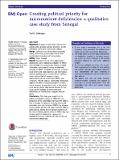| dc.contributor.author | Balarajan, Yarlini | en_US |
| dc.date.accessioned | 2014-09-08T15:36:07Z | |
| dc.date.issued | 2014 | en_US |
| dc.identifier.citation | Balarajan, Yarlini. 2014. “Creating political priority for micronutrient deficiencies: a qualitative case study from Senegal.” BMJ Open 4 (8): e004784. doi:10.1136/bmjopen-2014-004784. http://dx.doi.org/10.1136/bmjopen-2014-004784. | en |
| dc.identifier.issn | 2044-6055 | en |
| dc.identifier.uri | http://nrs.harvard.edu/urn-3:HUL.InstRepos:12785825 | |
| dc.description.abstract | Objectives: To examine what factors influence the agenda-setting process and level of political priority afforded to micronutrient deficiencies (MNDs). Design: Qualitative case study employing process tracing, informed by primary data collected from semistructured interviews with policymakers. Setting: Dakar, Senegal. Results: Several facilitating and impeding factors affecting the level of political prioritisation for MNDs were identified. Facilitating factors included multiple stakeholders using aligned framing to collectively advocate for MNDs; availability of indicators to quantify issue severity and raise awareness; and transnational advocacy activities around micronutrients. Impeding factors included lack of awareness among policymakers and civil society about MNDs; issue complexity, with the need for coordinated multisectoral response to deliver a complex package of solutions; lack of resources trapping the issue in a ‘low-priority’ cycle; lack of a policy champion to advocate for the issue and the challenge of demonstrating the effectiveness of interventions to support advocacy efforts. Conclusions: This study gives insight into the political prioritisation process for MNDs from the perspective of key stakeholders working at the national level in Senegal. In doing so, the study offers some explanation as to why the issue of MNDs has struggled to gain political attention and make it onto the national policy agenda. Moving forward, greater awareness of the factors affecting agenda setting for MNDs may help to devise political strategies to champion this development issue in countries with high burdens of micronutrient deficiencies. | en |
| dc.language.iso | en_US | en |
| dc.publisher | BMJ Publishing Group | en |
| dc.relation.isversionof | doi:10.1136/bmjopen-2014-004784 | en |
| dc.relation.hasversion | http://www.ncbi.nlm.nih.gov/pmc/articles/PMC4127923/pdf/ | en |
| dash.license | LAA | en_US |
| dc.subject | Micronutrients | en |
| dc.subject | Political Priority | en |
| dc.subject | Agenda Setting | en |
| dc.title | Creating political priority for micronutrient deficiencies: a qualitative case study from Senegal | en |
| dc.type | Journal Article | en_US |
| dc.description.version | Version of Record | en |
| dc.relation.journal | BMJ Open | en |
| dc.date.available | 2014-09-08T15:36:07Z | |
| dc.identifier.doi | 10.1136/bmjopen-2014-004784 | * |


